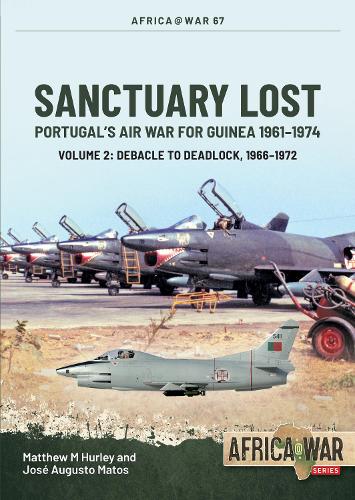
Sanctuary Lost: Portugal's Air War for Guinea, 1961-1974 Volume 2: Debacle to Deadlock, 1966-1972
(Paperback)
Publishing Details
Sanctuary Lost: Portugal's Air War for Guinea, 1961-1974 Volume 2: Debacle to Deadlock, 1966-1972
By (Author) Matthew M Hurley
By (author) Jose Matos
67
Helion & Company
Helion & Company
14th November 2023
15th July 2023
United Kingdom
Classifications
General
Non Fiction
General and world history
African history
European history
Colonialism and imperialism
Decolonisation and postcolonial studies
966.5702
Physical Properties
Paperback
112
Width 211mm, Height 297mm
Description
From 1963 to 1974, Portugal and its nationalist enemies fought an increasingly intense war for the independence of "Portuguese" Guinea, then a colony but now the Republic of Guinea-Bissau. For most of the conflict Portugal enjoyed virtually unchallenged air supremacy, and increasingly based its military strategy and political pacification program on this singular advantage. The Portuguese Air Force (Fora Area Portuguesa, abbreviated FAP) consequently played a crucial role in the Guinean war. Indeed, throughout the conflict, the FAP - despite the many challenges it faced - proved to be the most effective and responsive military argument against the PAIGC rebels, which was fighting for the colony's independence from European rule. The air war for Guinea stands as a remarkable episode in air power history for several reasons. It was, for example, the first conflict in which a non-state irregular force deployed defensive missiles against an organized air force. Moreover, the degree to which Portugal relied on its air power was such that its effective neutralization doomed Lisbon's military strategy in the province. Ultimately, the FAP's unexpected combat losses initiated a cascade of effects that degraded, in turn, its own operational initiative; the battlefield effectiveness of increasingly air-dependent ground forces; Portuguese military morale and national resilience; and ultimately, Lisbon's tenability as an imperial power. The air war for Portuguese Guinea thus represents a compelling illustration of the value - and vulnerabilities - of air power in a counter-insurgency context, as well as the negative impacts of overreliance on air supremacy. This work is part of a three-volume history. This volume, the second, examines the evolution of Portuguese air power and guerrilla air defenses during the conflict's most active years, as both sides sought the means and methods required to counter the other's efforts to control Guinea's airspace. AUTHORS: Matthew M. Hurley is a military historian and retired US Air Force colonel, having served in intelligence assignments worldwide and as an instructor at both the Tactical Leadership Programme and Air Command and Staff College. He has published numerous studies regarding airpower history and campaign analysis, including works for the Air Force Research Institute and the Mitchell Institute for Aerospace Studies. Jos Matos is an independent researcher in military history in Portugal with primary interest in operations of the Portuguese Air Force during colonial wars in Africa, especially in Guinea. He is a regular contributor to numerous European magazines on military aviation and naval subjects, and has collaborated in the major project 'The Air Force at the end of the Empire', published in Portugal in 2018. This is his first instalment for Helion. 84 b/w photos, 20 colour profiles, 24 b/w maps, 1 colour map, 5 diagrams, 20 tables, 7 graphs
Reviews
"Thanks to the recollections of those who participated as well as good primary research, we are provided a picture of the war as it continued."-- "ModelingMadness.Com"
Author Bio
Matthew M. Hurley is a military historian and retired US Air Force colonel, having served in intelligence assignments worldwide and as an instructor at both the Tactical Leadership Programme and Air Command and Staff College. He has published numerous studies regarding airpower history and campaign analysis, including works for the Air Force Research Institute and the Mitchell Institute for Aerospace Studies. Jose Matos is an independent researcher in military history in Portugal with primary interest in operations of the Portuguese Air Force during colonial wars in Africa, especially in Guinea. He is a regular contributor to numerous European magazines on military aviation and naval subjects, and has collaborated in the major project 'The Air Force at the end of the Empire', published in Portugal in 2018. This is his first instalment for Helion.
